|
|
|
Sort Order |
|
|
|
Items / Page
|
|
|
|
|
|
|
| Srl | Item |
| 1 |
ID:
148831


|
|
|
|
|
| Summary/Abstract |
A twenty-first century version of the Great Game is unfolding in Afghanistan, even as its internally fractured regime strives to stabilise a land ravaged by 14 years of war that has not yet ended. Once the arena of intense rivalry between the British Indian Empire, Tsarist Russia and the Chinese authorities, with Persia a keen watcher on account of the region’s geostrategic location as gateway to India, Persia, and Muslim Central Asia (part of the ancient Silk Road trade route), the stakes today are higher than ever before.
|
|
|
|
|
|
|
|
|
|
|
|
|
|
|
|
| 2 |
ID:
148412
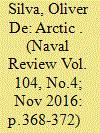

|
|
|
| 3 |
ID:
141155
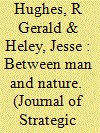

|
|
|
|
|
| Summary/Abstract |
This article argues for the continued relevance of the work and theories of the British Geostrategist Sir Halford J. Mackinder (1861-1947). It asserts that commentators and scholars who seek to marginalise Mackinder have too often dismissed his theories without setting them in the context of their continued endorsement in crucial areas of the globe. After 1945, despite his theories being tainted by association with Nazi Germany and Imperial Japan, both Moscow and Washington recognised the utility of Mackinder’s work and tailored policy accordingly. The end of Cold War saw Mackinder fall out of favour as his model was deemed unsuitable for policy analysis by a number of influential thinkers. It is argued here that, in recent years, the arena of international politics has seen a rehabilitation of Mackinder, accompanied by a resurgence of interest in Geopolitics. Finally, the piece examines those areas of the contemporary globe where Mackinder’s influence is greatest.
|
|
|
|
|
|
|
|
|
|
|
|
|
|
|
|
| 4 |
ID:
192498


|
|
|
|
|
| Summary/Abstract |
D
ue to its unique geographical and geopolitical location,
Central Asia has always been a crossroads for great powers.
Because of the special nature of relations between Central
Asia and Russia, great power relations for the Central Asian countries
are of particular importance, including with regard to their political
security. Therefore, proper management of great power relations is not
only a diplomatic skill for Central Asian countries, but also a way to
ensure their security and stability.
|
|
|
|
|
|
|
|
|
|
|
|
|
|
|
|
| 5 |
ID:
124876
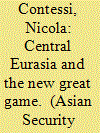

|
|
|
|
|
| Publication |
2013.
|
| Summary/Abstract |
In the 20 years since independence from the former Soviet Union, the study of Eurasia in International Relations (IR) has received considerable impetus in both the academic and policy circles. Specialized news and analysis outlets have come online, research centers have multiplied within universities, and a variety of think tanks now host dedicated programs. In other words, this still relatively little-known region has glamour. Yet Eurasia remains difficult to situate as an object of study due to its distinctive hybridity: geographical, at the crossroads between Europe and Asia; cultural, Muslim Russianspeaking Turkic peoples with Asian traits and traditions; political, straddling Western and Asian institutional forms domestically, and contiguous to Europe, Asia, Russia, the Middle East, and Afghanistan internationally. Partly as a result of this hybridity, Eurasia is a somewhat elusive object of study. At a minimum, it comprises the two subregions on each shore of the Caspian basin: Central Asia to the east and the Caucasus to the west. Reflecting this elusiveness, Central Asian states (CAS) belong to the Asia-Pacific Regional Group at the United Nations; they are members of the Asian Development Bank and the Economic Commission for the Asia-Paci?c. At the same time, they are members of the Organization for Security and Cooperation in Europe (OSCE), the European Bank for Reconstruction and Development, and the Euro-Atlantic Partnership Council, a North Atlantic Treaty Organization (NATO) ancillary forum. But they also have distinctly Central Asian groupings, such as the Eurasian Development Bank, the UN-af?liated Central Asian Regional Information and Coordination Center, not to mention the Shanghai Cooperation Organization (SCO) and Collective Security Treaty Organization (CSTO). Similarly, the three Caucasian states share most of the same af?liations, except for belonging to the East European Regional Group at the UN
|
|
|
|
|
|
|
|
|
|
|
|
|
|
|
|
| 6 |
ID:
070686
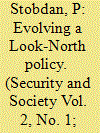

|
|
|
| 7 |
ID:
166802
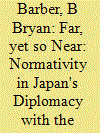

|
|
|
|
|
| Summary/Abstract |
Japan has been playing a steady and pivotal role in Central Asia since the fall of the Soviet Union, but to presume Tokyo's engagement is predicted on strategic interests that compete with other powers such as Russia and China in the so-called “New Great Game” is naïve to the activities occurring on the ground. Newly independent and largely unaffected by Japanese past aggression, the five Central Asian states present a unique “petri dish” for Japan's values-based diplomacy in Asia. This study analyzes significant Japanese foreign policy measures with the Central Asian republics since independence, and—through examination of speech acts by the political elites, practices on the ground, and within the institutional framework of the Central Asia Plus Japan dialogue—draws out the normativity evident in Tokyo's Central Asian policy. Using a symbiotic framework for foreign policy analysis of geopolitics, geo-economics, and geoculture, this study isolates geoculture from the two other dynamics in order to illustrate how norms operate independently from strategic interests in the region.
|
|
|
|
|
|
|
|
|
|
|
|
|
|
|
|
| 8 |
ID:
152934


|
|
|
|
|
| Summary/Abstract |
This article looks at the “New Great Game” as the most widely used metaphor for the geopolitical dynamics of Central Asia. Its focus is on Kazakhstan and Europe with particular reference to energy policies. The European approach to Kazakhstan is conditioned by its energy security priorities with issues of democracy and human rights relegated to the margins. For Kazakhstan, the article suggests that the game is played with an eye to regime legitimacy, territorial integrity, and international recognition. Relations between Kazakhstan, China and Russia are also examined. Some of the limitations and strengths of the Great Game metaphor are analysed.
|
|
|
|
|
|
|
|
|
|
|
|
|
|
|
|
| 9 |
ID:
117562
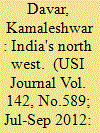

|
|
|
| 10 |
ID:
145160
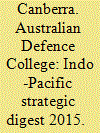

|
|
|
|
|
| Publication |
Canberra, CDSS, 2015.
|
| Description |
289p.pbk
|
|
|
|
|
|
|
|
|
|
|
|
Copies: C:1/I:0,R:1,Q:0
Circulation
| Accession# | Call# | Current Location | Status | Policy | Location |
| 058664 | 320.12091823/CAN 058664 | Main | On Shelf | Reference books | |
|
|
|
|
| 11 |
ID:
065469
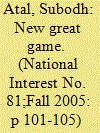

|
|
|
| 12 |
ID:
142133
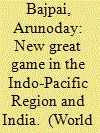

|
|
|
|
|
| Summary/Abstract |
In the post-Cold War scenario, NAM may appear out of place but its cardinal principle-'independence of foreign policy' continues to be relevant in the present context also, because India as the largest democracy with desire to play a respectful role in global affairs needs her own foreign policy choices, which are in tune with her core national interest. The principle of independence of foreign policy has resurfaced as 'strategic autonomy' in the Indian policy making circles. In the wake of the signing of the joint strategic vision statement between India and the US in January 2015, China has appreciated India's principle of 'strategic autonomy' in foreign policy. Thus, India needs to play a balancing act in the ongoing great game between the US and China for protecting her long-term interests and for peace and stability in the Indo-Pacific region.
|
|
|
|
|
|
|
|
|
|
|
|
|
|
|
|
| 13 |
ID:
186127
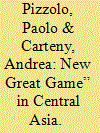

|
|
|
|
|
| Summary/Abstract |
Situated at the crossroads of the Silk Road, Central Asia has been an arena of international competition for centuries. Today, a “New Great Game” appears to be taking place between Russia, China and, to a lesser extent, the United States and the European Union for regional hegemony. In the last two decades, Russia and China formed an “axis of convenience”, both to counter Western influence and to thwart regional challenges; however, this has increasingly turned to rivalry in recent years, with China gradually replacing Russia as the chief power with regard to geo-economic and energy assets in some Central Asian countries. An analysis based on Power Transition Theory points to two possible future scenarios for the rivalry, namely China’s predominance or a Chinese-Russian modus vivendi based on a ‘division of labour’.
|
|
|
|
|
|
|
|
|
|
|
|
|
|
|
|
| 14 |
ID:
142359
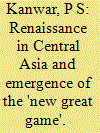

|
|
|
| 15 |
ID:
142089
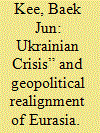

|
|
|
|
|
| Summary/Abstract |
This article focuses on the current arguments and geopolitical visions regarding the organizational shifts in Europe and the Eurasian region and the means for realization of these policies. It shows the responses of the major powers in Europe and Eurasia with regard to the “Ukrainian Crisis.” In this article also, analysis and comparison of the Eurasian strategy of China and Russia, which bear critical importance to geopolitical and geoeconomic considerations regarding the Korean Peninsula, is treated with significance along with the aforementioned issues. The article attempts to provide a short analysis of the implications of these pan-Eurasian strategic shifts on the Eurasian initiative of the Korean government. The concepts of Russia’s “Pivot to the East,” China’s “One Belt, One Road (OBOR),” and Korea’s “Eurasia Initiative” share a potential to stimulate the transition of the Asia-Pacific region from “the ocean of conflict” to “the ocean of peace.” However, in realizing these concepts, the relationship between Korea and the four powers (U.S.A./China/Russia/Japan) have a “strategic trilemma.” If the Eurasia Initiative can facilitate construction of the “continent of peace” in Eurasia, it will provide a vision and strategic opportunity to change the region form an “ocean of conflict” into an “ocean of peace.”
|
|
|
|
|
|
|
|
|
|
|
|
|
|
|
|
|
|
|
|
|